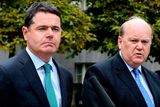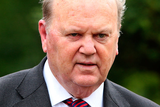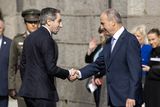Shane Coleman: The yo-yo approach gets yet another airing on Budget Groundhog Day


We pretty much know what's going to be unveiled in the Dáil today. God, do we know. Irish Budget speeches can be broadly divided into two categories: good times speeches and bad times speeches. There's really no in-between.
For the good times (see, for example, 1977-1980 and 1996-2007), it's across-the-board spending increases and tax cuts like there's no tomorrow. For the bad times (eg 1973-76, 1982-1989 and 2008-2014), it's ... well, the reverse: across-the-board spending cuts and tax increases, because without them there may be no tomorrow.
Happily, today's speech falls into the former category (tax cuts and spending increases). But the history of the past 50 years tells us it's only a matter of time before we're back into the latter grouping. Yet, somehow, we never seem to grasp the link between our ongoing boom-and-bust cycle and our yo-yo approach to Budgets.
You can be sure that the budgetary policy of Germany - a bastion of economic stability - doesn't swing so wildly between extremes.
Does Germany halve its Capital Gains Tax rate to 20pc one year and then a few years later bring it back to 33pc? Or raise government spending by double digit percentages for years, resulting in a double digit percentage budget deficit when the wheels come off?
Of course it doesn't. And that just might be why it is that bastion of economic stability.
You'd imagine we would have learned the lessons from the economic and financial crash, given how painful it was for everybody. Yet here we are, barely out of the woods, and already the promises about tax cuts, taking people out of the tax net, pension increases, more public servants and, most incredibly, first-time buyers' grants, are in full flow.
What was it Einstein supposedly said about the definition of insanity being doing the same thing over and expecting different results?
And that makes this year's great budgetary give-away - "we promised you a billion euros, but we're gonna raise that to €1.2bn" - all the more depressing.
Back in 2009/2010, some of us at least drew small consolation from a (misguided and naive) belief that the crisis represented a chance to start doing things right in this country: reform, common sense policies, the loss of power of vested interests, etc.
Yet here we are in Budget Groundhog Day once again. It's arguably worse this time. Not just because we should now know better. But because we're fully aware of the potentially catastrophic fall-out from Brexit.
Yet despite that, here we are again with a Government planning to spend money that it can't say with certainty it'll still have to spend in three or four years' time.
Sure, we're at the top of the upswing. But it's still yo-yo economics.
Imagine it were different. Imagine we had learned the lessons of the noughties and decided to take account of potential dangers that lie ahead. In that scenario, Michael Noonan's speech today might sound something like this:
"A Cheann Comhairle, I stand before the house today with our country at a crossroads. Notwithstanding the massive strides we have made (cue positive news about falling debt, balanced budgets, drops in unemployment), we are facing into hugely uncertain times.
"The decision of our closest ally and biggest trading partner to leave the EU has enormous implications for Ireland. Suffice to say that, as the only state in Europe with a land border with the UK, the challenges we face from a British exit from the EU are unique.
"Anticipating the precise nature of the fall-out from Brexit is impossible. So much is dependent on factors outside our control. That is why we must proceed with the utmost caution.
"A decade ago or more, the government of the day ignored warning signs that problems might be afoot and introduced a succession of expansionary budgets. I would be failing in my duties as Finance Minister were I now to risk repeating that folly.
"Our best estimation is that the downside from Brexit will be manageable for this economy. However, until we are in a position to fully assess the nature of Britain's exit from the EU, the implications for its economy, for Sterling, for the single market and, crucially, for the border that divides the north and south of this island, it is wise to proceed cautiously.
"For this reason, I am proposing to the house that this year's Budget will be largely neutral - no tax cuts or spending increases beyond upholding the existing level of services.
"And we will maintain that approach until we know the full implications of Brexit on our economy and we can be certain that any 'fiscal space' is sustainable. A Cheann Comhairle, I commend this (non) Budget to the house".
What would the reaction be to such a speech? There would be hell to pay on the floor of the Dáil. Various vested interests would go berserk. It would probably cause an election. But it might also hugely appeal to a large chunk of voters. Those voters who don't have short memories and who are rightly cynical about auction politics and where it'll take us. It might even prove to be an electoral master-stroke.
But, much more important than the politics of it, it would be the right thing to do. For the first time arguably ever, a government would be taking difficult decisions before a crisis hit, as opposed to after it - when we always take them.
Imagine a government actually saying: "I won't spend money because I think there's a chance, due to Brexit, that we'll have to take that money back again in the next few years. Governments here have done that too often in the past and we owe it to the Irish people not to keep repeating that mistake."
Now that really would be 'new politics'.
Sadly, there's not the remotest possibility of it happening. Get ready for one more spin of the yo-yo.
Shane Coleman presents 'Newstalk Breakfast' on weekdays from 7am
Join the Irish Independent WhatsApp channel
Stay up to date with all the latest news
















